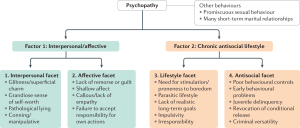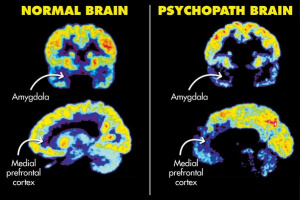Artstract by Olivia Pederson
What is Psychopathy?
Psychopathy is a personality disorder and is characterized by persistent antisocial behavior, impaired empathy and lack of remorse. Psychopathy is also grouped with antisocial personality disorder (ASPD) which is characterized by aggression, hostility, callousness, manipulativeness, deceitfulness, and impulsivity. Psychopathy is a severe manifestation of ASPD.
 ASPD affects 1-3% of the general population and affects 40-70% of prison populations.
ASPD affects 1-3% of the general population and affects 40-70% of prison populations.
Psychopathy affects 1% of the general population and affects 10-30% of prison populations.
How Does it Get Diagnosed?
Psychopathy is not listed in the Diagnostic and Statistical Manual of Mental Disorders (DSM-V) because it is underfunded and under treated. Another reason is that in the past, people who studied psychopathy were worried about the stigmatization that would come with a label such as ‘psychopath’ whereas other clinicians were worried about the ability to asses the traits associated with psychopathy (callousness, cruelty). Psychopathy was replaced with ASPD, which focuses more on the behavioral aspects of psychopathy. Because of this grouping, only about 1/3 of of those diagnosed with ASPD also fit the criteria for psychopathy.
According the the graph above, this type of disorder can be seen in all ages. For younger people, the closest diagnosis is called conduct disorder, which manifests itself as lack of guilt, lack of remorse, callous lack of empathy, lack of concern for oneself, and a general lack of emotional expression.
 When diagnosing psychopathy, a questionnaire called the Psychopathy Checklist Revised (PCLR). This is a 20 item scale that is scored from interview and file information. This questionnaire tests two different factors:
When diagnosing psychopathy, a questionnaire called the Psychopathy Checklist Revised (PCLR). This is a 20 item scale that is scored from interview and file information. This questionnaire tests two different factors:
- Factor 1: Emotional Detachment
- superficial charm, manipulativeness, shallow affect, lack of guilt and lack of empathy
- Factor 2: Antisocial Behavior
- deviance from an early age, aggression, impulsivity, irresponsibility, process to boredom
This questionnaire will lead to a score and then placed on a scale and compared to ‘normal’ ranges.
What Drives Psychopathy?
 Researchers do not know much about the true cause of psychopathy and ASPD. Previous research has shown that there may be some brain abnormalities involved with the symptoms of psychopathy and ASPD. In this research, the amygdala (an important structure for emotional-processing) was smaller in people with the symptoms associated with these disorders.
Researchers do not know much about the true cause of psychopathy and ASPD. Previous research has shown that there may be some brain abnormalities involved with the symptoms of psychopathy and ASPD. In this research, the amygdala (an important structure for emotional-processing) was smaller in people with the symptoms associated with these disorders.
In other studies, it has showed that there are genes involved with these disorders. Research like this has not really been done before so it is astonishing to make this connection between genes and personality disorders. Genes such as ZNF132 and RPL10P9 were shown to be abnormal in those with ASPD/psychopathy. These genes were unable to make the correct amount of protein for the cells, which lead to insulin activity and glucose metabolism.
Another connection found in this research is the fact that there were changes in the opioid system, which supports prosocial functions (empathy). The opioid system is deficient which contributes to ASPD, which could mean that antisocial individuals attempt to stimulate their opioid system by the rewarding effect they get from impulsive and aggressive behavior.
Stereotypes?
 There are many stereotypes when it comes to the term psychopath. Most of these stereotypes come from media. Most notably, Joe Goldberg from the hit TV show You and Norman Bates from the hit TV show Bates Motel. The TV and movie industry has made a lot of money off of dramatizing people and the term psychopath, but these are not an accurate depiction of what it is like to live with the psychopath label (Norman and Norma Bates on the left and Joe Goldberg below).
There are many stereotypes when it comes to the term psychopath. Most of these stereotypes come from media. Most notably, Joe Goldberg from the hit TV show You and Norman Bates from the hit TV show Bates Motel. The TV and movie industry has made a lot of money off of dramatizing people and the term psychopath, but these are not an accurate depiction of what it is like to live with the psychopath label (Norman and Norma Bates on the left and Joe Goldberg below).
Being labeled a psychopath, or a sociopath, or even as someone with ASPD can be debilitating. While there is some forms of treatment to try and help people change their thought patterns and their behaviors, this label will forever be with them. Not everyone with this label is a cold-blooded, evil monster. These people are human beings just like you that don’t get to choose whether their genes code for this major lack of empathy.
So the next time you grab a bowl of popcorn and throw on a mystery/thriller movie with a psychopath killer, try to remember that not everyone labeled a psychopath is going to be a murderer.
References:
pubmed.ncbi.nlm.nih.gov/31455857
